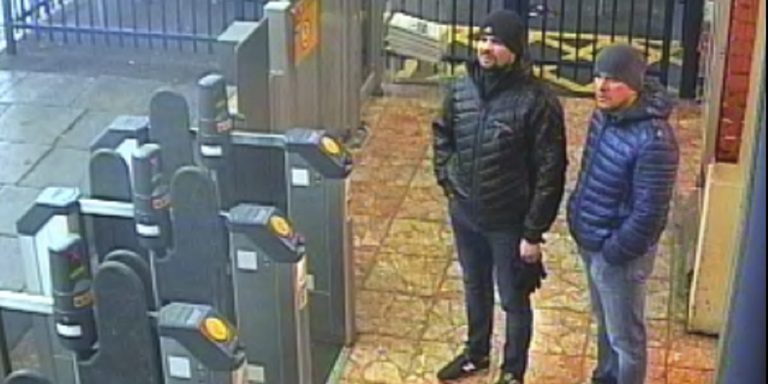INTELBRIEF
September 10, 2018
IntelBrief: The Brazen TradeCraft of Russia’s Novichok Operation

- On September 5, the U.K. charged two men it says are Russian military intelligence officers with the March assassination attempt of a former Russian intelligence officer serving as a double agent for the British.
- The following day, the U.S., France, Germany, and Canada issued a joint statement supporting the U.K. over its claims that Russia deployed a deadly nerve agent in the attack in Salisbury.
- The tradecraft used by the Russians was adequate to conduct the attack and suitable for the hind-sight counterintelligence threat environment, including CCTV surveillance.
- The after-the-fact evidence is irrelevant to the Kremlin, seemingly unconcerned about outrage or condemnation in the wake of the brazen attack.
.
On September 6, the governments of the United States, Canada, France, and Germany issued a statement in support of the U.K.’s assessment of the direct culpability of the Russian government in the March 2018 attempted assassination of two Russian nationals on British soil. The statement is direct: ‘We have full confidence in the British assessment that the two suspects were officers from the Russian military intelligence service, also known as the GRU, and that this operation was almost certainly approved at a senior government level.’ The statement follows the September 5 announcement by the U.K. that it was charging two Russian nationals—using the likely aliases of Alexander Petrov and Ruslan Boshirov—with conducting the attempted murder of Sergei Skripal and Yulia Skripal on March 4, in Salisbury.
From the beginning, the case had all the makings of a Hollywood spy thriller, complete with revelations that the attack involved an extremely rare nerve agent developed in Russia, known as Novichok. Both Sergei and Yulia Skripal survived the attack, but only after extensive medical treatment. Still, there was other collateral damage. The issue became a murder investigation in July after the death of Dawn Sturgess, a British national who appeared to be exposed to the nerve agent after the fact and unintentionally. Even as the U.K. released more information regarding the culpability of the Russian government in an attack involving a nerve agent only it possesses, Moscow continued its longstanding approach of denial and deflection. Instead of replying to these serious accusations, Russia blithely dismissed the investigators and using social media to troll all involved with what it nonchalantly derided as ‘alternative theories.’
The identification of the two Russian military intelligence officers (said to belong to Russia’s main intelligence directorate for its military, Glavnoye Razvedyvatel'noye Upravleniye or GRU) followed a painstaking recreation of their movements, aided in large part by the ubiquitous network of surveillance cameras in the U.K. The two are seen entering the country on March 2, staying in London, and traveling to Salisbury. They leave the country hours after the attack on March 4. They entered the country carrying the Novichok in a modified perfume bottle, which U.K. authorities released a picture of in its September 4 statement.
And while the international opprobrium directed at Russia for this cavalier act is warranted, criticism of the ‘sloppy’ tradecraft by the two Russian operatives seems misplaced. After all, only in hindsight did the two men seem obvious. They managed to smuggle a deadly nerve agent into a country with effective border controls; evade suspicion in London for several days while determining their surveillance status to discern if they were being physically followed by U.K. authorities (which they were not); and conduct the operation before departing without notice.
Widespread surveillance is of tremendous importance to investigations after the fact,but rarely preventative in nature. The Soufan Group has written extensively about the ‘Counterterrorism Hind Sight Machine’ that springs into action after terror attacks, providing crucial details of the attackers very quickly and often giving the impression that the perpetrators were being monitored in real time, when is rarely the case.
For Russia, even though the assassination attempt failed, the Novichok operation could still be considered a success. The traditional critique of the tradecraft of the Russian operatives overlooks the symbolism of the attack and minimizes the larger point of Russia’s response to facts. Instead of diplomatic immunity, these brazen Russian intelligence operations rely on outrage immunity; the Russian government is immune to condemnation of its actions and its operatives, once back home, are protected from international extradition and prosecution.
While the West sees footage of two Russian operatives being repeatedly recorded on a failed assassination attempt, Moscow knows that dissidents and outspoken critics of Putin see something very different—two GRU operatives moving freely in one of the most heavily surveilled countries on earth, conducting an operating using a nerve agent, and then safely and seamlessly returning back to Russia undetected, until it is too late to apprehend them.
.
For tailored research and analysis, please contact: info@thesoufancenter.org
[video width="960" height="540" mp4="https://thesoufancenter.org/wp-content/uploads/2018/09/IB-0910.mp4" poster="https://thesoufancenter.org/wp-content/uploads/2018/09/AP_18248381899633.jpg"][/video]